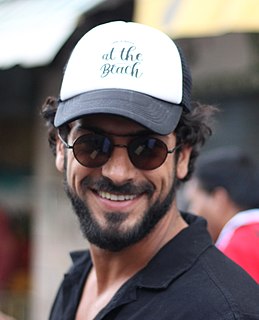A Quote by Leonardo DiCaprio
It's very hard to impose your beliefs or a specific message about any given movie. I think that audiences always extract what they want from a film even if something isn't overtly political. They may or may not get it, and it's hard to control that.
Related Quotes
I don't think people realize, when they're just getting started on an eating disorder or even when they're in the grip of one, that it is not something that you just "get over." For the vast majority of eating-disordered people, it is something that will haunt you for the rest of your life. You may change your behavior, change your beliefs about yourself and your body, give up that particular way of coping in the world. You may learn, as I have, that you would rather be a human than a human's thin shell. You may get well. But you never forget.
I don't think anything surprised me. It was very hard for me, this story, The Snack, as a father. I have family in the army in Israel, I know families that lose their children, and I think this is the most hard thing, is faith. Because what happens after death is always belief, it's always something that you don't have any answers about, and I think the movie helps you to understand that death is part of the life. It makes it more natural.
I hate political films that have one particular message that they're trying to convey. I think propaganda is very dangerous, and it's very easy for anything to slip into it. I also think that propaganda is something that defies the identity of cinema. I hate propaganda in cinema, even if it was promoting the political stance that I myself am allied with. I always say that the responsibility of a film is first and foremost: To be a film. It's not a manifesto, it's not an op-ed.
I have always had a deep belief that every movie, every artistic expression, is political. Don't be fooled. Even ones that we wouldn't consider overtly political are political. When we spend time doing anything, whether it's distraction or whether it's something that we have to face, it is always political. That's my belief.
My parents worked very hard for everything that they got. Their parents worked hard. It's just something that is passed down to you, and whatever you want to accomplish, you have to work hard to get it, and that's always been that mentality that my family has, and I think that's something that was passed on to me.
But then male directors also have a hard time getting their movies made... not as hard as women but it's a tough time for any movie this size. And that particular movie [The Hurt Locker] was so specific. It couldn't hurt, of course, and I'm really glad for her, but I don't know how much it will change things, if at all. The film industry is still so sexist.
I think Black Nativity movie has a very clear message. It's about a family in crisis facing some of the very familiar struggles we face in our communities. It's really about love, redemption, forgiveness, faith and family, the things that have gotten us through so many hard times, and that continue to get us through them. When times are hard, we need each other.
I'm not trying to be self-serving, but you know, you get to Hollywood, and if you want to make something big and loud and dumb, it's pretty easy. It's very hard to go down there and make a film like 'Sideways,' which I thought was a great film. They don't want to make films like that anymore, even though that film was very successful.
Why extremists always focus on women remains a mystery to me. But they all seem to. It doesn’t matter what country they’re in or what religion they claim. They all want to control women. They want to control how we dress. They want to control how we act. They even want to control the decisions we make about our own health and our own bodies. Yes, it is hard to believe but even here at home we have to stand up for women’s rights and we have to reject efforts to marginalize any one of us, because America has to set an example for the entire world.




































